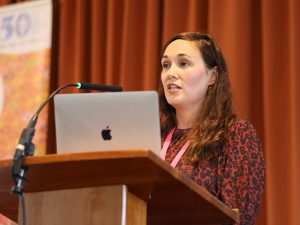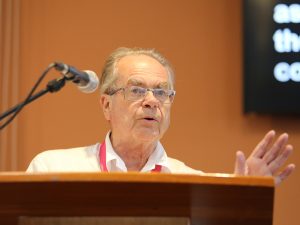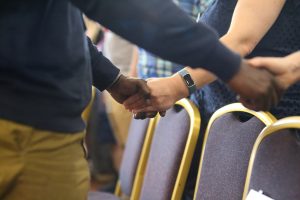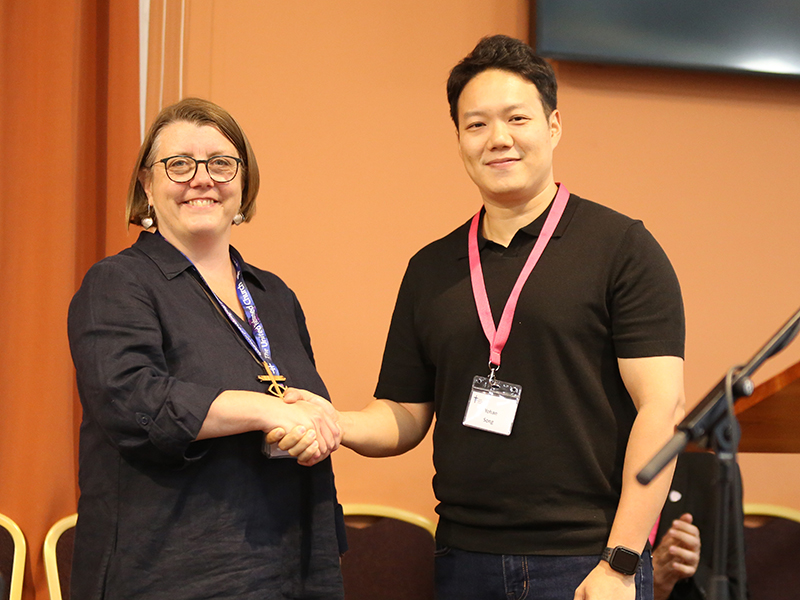Day three of the United Reformed Church 2023 General Assembly started with worship and a Bible study led by Dr Nicola Brady, General Secretary of Churches Together in Britain and Ireland, themed “A space of grace is a space of reconciliation and peace-making”.
In her study, Dr Brady explored the theme through Mark 4:35-41, saying: “Today we focus in a specific way on the call to be peacemakers and agents of reconciliation. Too often the work of peace and reconciliation is viewed as an optional extra for people who like that kind of thing, rather than an integral part of the discipleship to which we are all called.
“This is one reason why, at this time of such turmoil and pressures on relationships from local level through to the global, the Church is perhaps not having the impact we would wish to see as a voice for peace.
“Our Scripture passage for today invites us to once again imagine ourselves journeying with Christ, but this time on a boat sailing through stormy waters.
“In 2010 I was in Lviv in Ukraine doing peace-building work in the Greek Catholic University, sharing experiences from our Irish context with the students there to explore what the lessons might be for Ukrainian-Russian reconciliation, which is sad to recall when we think of what’s happening there at the minute.

“I mention it because the Ukrainian bishop who was on the panel with me spoke on this Scripture passage and he had a very interesting take on it which has stayed with me since then. He asked the group to consider how it was that Jesus was able to calm the storm, which seemed to me a very strange question — I mean, it’s Jesus, what more explanation could you need?
“But then he went on to suggest that Jesus was able to calm the storm because what Jesus brought into situations was peace in his heart.
“I invite you to bring your attention back to the boat and to the fears and concerns you may have identified earlier. Do you find yourself approaching these with peace in your heart, or do you bring that storm inside also? If so, what could help you to calm that storm?
“Now of course it helps to know that we are not alone in the boat. There are other disciples, fellow-travellers, and for many of us the image of the boat is associated with ecumenism and our relationships with other churches. Most importantly, we have Christ with us in the boat. Christ who is calling us to have faith.
“From my work I would say that there is a wealth of under-developed capacity in our churches, at all levels, for peace and reconciliation work that is so badly needed at present. Yes, there are clear issues of resources, but there are also questions around what we prioritise, and there is a significant challenge in terms of confidence.
“Sharing our wounds, helping to carry one another’s burdens, this for me is what it means to be in a space of grace that is a space of reconciliation and peace-making.”
Read the full General Assembly Bible Studies at www.urc.org.uk/general-assembly.
Session seven
Paper X3 – North Western Synod: Illegal Migration Bill
Paper X3 was presented by John Skipworth, North Western Synod General Assembly representative.
John started by expressing sadness at having to bring Resolutions 73-76 which focus on how the Illegal Migration Bill makes the only ‘safe and legal routes’ to the UK from Afghanistan, Syria, and Ukraine with people from other countries being classed as “illegal” and therefore unable to apply for asylum here.
Resolution 76 was remaindered as clarification was sought on its wording.
John highlighted how the rights afforded under the Convention for the Protection of Human Rights and Fundamental Freedoms 1953 were being stripped away by the Bill.

He went on to commend the work of Darwin URC and the many charity and faith groups supporting people seeking asylum in the UK which, he said, demonstrates the compassionate society that Jesus wishes.
John asked Assembly to put themselves in the shoes of asylum seekers, how tiring their journeys are, the stress and anxieties that they are placed under.
Along with the resolutions asking General Assembly to invite churches and members of the URC to write to their MPs expressing their opposition to the Illegal Migration Bill, they also invited General Assembly to express its deep concern that those arriving in the UK will be unable to apply for asylum and to strongly object to the Bill as it potentially breaches the Convention for the Protection of Human Rights and Fundamental Freedoms 1953, of which the UK is a signatory.
Concern was raised over the use of the word “illegal” – that seeking asylum is not an illegal activity and that by using the word it condones the government’s use of the word as the term “illegal” is a loaded political term. It was suggested that the phrase “arrive in the UK via irregular routes” was used instead. The resolution 73 was amended to reflect this. It was also proposed to remove the word “safe” from the resolution as for example, the government are trying to deport asylum seekers who arrive in the UK in breach of immigration controls to countries such as Rwanda which is considered by many, including the Court of Appeals, as not to be a “safe” country.
John pointed out that was indeed the point, that the ideal would be that asylum seekers are not removed to any third country, but if they are that it be safe. However, the Assembly clarified that it did not believe that any third country would be safe.
Assembly decided to discuss the paper in a facilitation group, and it was then remaindered to session seven of Assembly.
Neil Thorogood then explained how after some consultation, Resolution 73 is presented by the facilitation group in a revised form, and resolutions 74, 75, and 76 are withdrawn.

Resolution 73 now reads:
- a) General Assembly invites churches and members of the URC to write to their MPs and prospective Parliamentary candidates expressing their opposition to the Illegal Migration Bill (2023) and urging them to support the development of safe and legal routes for those seeking asylum
- b) General Assembly expresses deep concerns about the Illegal Migration Bill on the grounds that it potentially breaches the Convention for the Protection of Human Rights and Fundamental Freedoms (1953) and undermines the UK’s long – standing commitment to the protection of human dignity.
- c) General Assembly affirms its support for the aim of the Convention in maintaining an internationally recognised legal standard of human dignity that reflects the nature of God, revealed in the Bible, and urges the UK government to uphold it.
Neil explained that the hope was that the revisions capture the spirit of what the original resolutions ought to do, but which General Assembly may find it easier to work with.
Queries from the floor centred on the ordering of the parts a, b and c, in the resolution e.g. asking for action before expressing the concern; and to simplify it further by saying “opposes” rather than expresses “deeply concern”. Neil advised the point of the ordering was to more or less focus on the point of action.
It was further clarified by Simeon Mitchell, Team Leader of the Joint Public Issues Team, that the Bill is currently going through parliament, therefore it is a moving document so it is best to say “deeply concerned” rather than “oppose” because the Bill has not yet been set in its final form.
Resolution 73 was then unanimously supported by Assembly and passed.
Paper N1/N2a – Church Life Review to follow.
Sunday Worship
The Rt Revd Sally Foster-Fulton, who has led Christian Aid Scotland since 2016, and is on a year’s sabbatical while serving as the as the Moderator of the General Assembly of the Church of Scotland, gave the homily to the General Assembly during Sunday Morning Worship, along the theme of “a space of grace is a space of connectedness to each other and the earth”.

The readings were Genesis 2: 8-10, Psalm 52: 8, John 15: 5 and Matthew 13: 31-32, and part of Captain Corelli’s Mandolin, by Louis de Bernieres: “Those that truly love have roots that grow towards each other underground, and when all the pretty blossoms have fallen from their branches, they find that they are one tree and not two.”
“Sacred space surrounds us,” Sally began. “If we are still, and sense it. Grace imbues creation and every created thing, calm, it is here, reaching deep like roots, grounding us and giving flight to our dreams. I invite you, as you’re able, to stand up and plant yourself in the spot you’ve found. Or plant your feet solidly as you sit.
There are almost 8 billion of us, a global neighbourhood – this sacred space shared with each other and God’s created order. My Grandmother had a saying – ‘Bloom where you are planted, and share the soil of God’s good earth.’
“Tree imagery, connectedness to each other and to the earth, shared sacred space. Root, trunk, branch and leaf – life exploding from earth. It’s everywhere in ancient literature and lore/ it’s planted throughout our sacred text … what we heard are just a few examples from the Bible.
“Maybe it’s because a tree is the embodiment of our lives – roots go deep, plant you firmly, ground you, nourish you – and yet you stretch … every growing thing does – leaves and flowers lean towards the sun, faces turn skyward … and a tree is a community in itself – a system of root and stem, branches and leaves and fruit – all intricately and intimately related.
“Like us, even though all too often, our actions deny it. Almost 8 billion people – plants, other creatures – sustainable earth vying for shared space. And everything inter-dependent.

“Behind every statistic we hear is someone’s story/behind every number is a name and a purpose and a dream. (Powerful discernment – illegal migration bill and the war in Ukraine/the climate catastrophe and how you as a community of faith will respond … all leaning into this grace-filled space of inter-connection.)
“What does the URC, this beautiful limb of the body of Christ need to plant, to nurture, to grow? Part of something bigger – thanks be to God.
“When we don’t see the beauty in the bigger picture, when we won’t work well as a cog in-a-wheel, when we can’t come round to the reality that the universe doesn’t revolve around us, forgive.
“Being human depends on others to be human with – help us embrace our interdependency. Part of something bigger – how beautiful! Thanks be to you, God.
“Go from this place and plant yourself in the spot you’ve found. Take a moment and be completely still. Close your eyes and feel the ground, solid beneath your feet.
“With feet firmly on the ground, with hands outstretched to embrace each other, with minds and spirits stretching skyward, we embrace your day – the eyes of our hearts open to your vision.”
Session eight
URC Treasure: Stepwise
David Sailsbury, and Steve Summers, introduced the Stepwise element of URC Treasure, in particular the Faith-filled Community element of the discipleship development programme which has five streams.
The elements of Faith-filled Community helps look at neighbourhoods and communities with fresh eyes to explore how churches can serve and bear witness to God’s love within them. It also explores how and why Christians can get involved and enable communities to flourish and introduces ideas about new and different ways of being church to help make a difference locally.
The programme is for anyone who wants to look outwards and be a presence in their community. Groups or individuals can undertake the stream. Although, Faith-filled Community is one of the longer streams of the programme, Faith-filled Life would need to be completed first. The Stepwise team or Synods can provide more information this, alternatively learn more about Stepwise.
En Bloc
The following resolutions were passed en bloc. En bloc resolutions are voted on without debate, having been deemed uncontroversial. This has no reflection on their importance. Read the full reports and resolutions in each case.
A1 – Business Committee: MIND remit and name
Following changes to incapacity procedure, this resolution updates the advisory group concerned.
A2 – Business Committee: Changes moving to one Moderator of General Assembly
Following changes to the number of Assembly Moderators, this resolution updates the role of former Moderators.
A3 – Business Committee: General Assembly and URC Trust
Updates the relationship between the Church and the Trust, following changes to regulation and compliance.
D1 – Education and Learning: Recruitment of a Westminster College Principal
Extends the pool from which the principal can be appointed, from members of the URC, to include members of partner Churches.
G2 – Finance Committee: URC Trust Accounts 2022
Notes the availability of the accounts.
G4 – Finance Committee: Churches’ Energy Crisis Fund
Information about the creation of the fund.
G6 – Finance Committee: URC Legacy Fund
Transfers money from the Legacy Fund for Church Life Review projects.
H2 – Ministries Committee: Core Competences for CRCW
Changes to the core competences for CRCWs
H3 – Ministries Committee: Pastoral Supervision Policy
Introduces the Pastoral Supervision Policy, replacing the Guidelines for Pastoral Supervision.
J1 – Nominations Committee: Report 2023
Makes nominations to roles in the Church, including the appointment of Alan Yates as Treasurer.
P1 – Law and Polity: Simplifying Processes
Brings clarity to disciplinary processes.
R1 – MIND: Redrafting Section O 5.2
Changes the wording of disciplinary rules.
R2 – MIND: Amendment to Section O Appendix J
Changes to the rules for the suspension of ministers.
R3 – MIND: Monitoring Cautions and Warnings
Changes to the rules for cautions for ministers.
R4 – MIND: Disciplinary Investigation Panel Increase
Enlarges the panel from 24 to 30 members.
R5 – MIND: Removal of Section P from The Manual
Ends the incapacity procedure for ministers.
T2 – Safeguarding Committee: Whistleblowing Policy
Introduces the Whistleblowing Policy
X4 – North Western and Mersey Synods: Synod changes
Transfers Macclesfield and Bollington URC to Mersey Synod.
Paper A4 – Synod Moderator Appointments
An unprecedented number of simultaneous retirements and moves by synod moderators, several of them unexpected at the time they occurred, together with a one-off rearrangement of Assembly Executive timings, has meant that an unusually long period might occur before an appointment could be confirmed.
On behalf of the Business Committee, the General Assembly Clerk, the Revd Dr Michael Hopkins, proposed that Assembly Officers be permitted to confirm appointments during the period between the 2023 and 2024 Assemblies.
Dr Hopkins was also ready to accept an amendment to the original resolution, adding a commitment to publicising the dates on which the appointing group would meet. This would allow any objections or concerns to be tabled between the time of nomination and the time of appointment.
Responding to a question, Dr Hopkins said that the proposal was time limited because the situation was not expected to arise again. The resolution was passed by Assembly by an overwhelming majority.
Paper A5 – Business Committee: Mediation and Reconciliation Resource
General Assembly passed this resolution asking the Business Committee bring proposals to the Assembly Executive next year, for a URC-wide Mediation and Reconciliation Service.
The Revd Dr John Bradbury, General Secretary, presenting the resolution, noted that as society had changed there were more complaints and more litigation in the synods. ‘By the time these things reach our desks,’ he said, ‘they are often already too late to resolve. It is getting harder to find individuals to take on mediation.’
Dr Bradbury noted the suggestion of the Revd Geoff Felton, Moderator of Mersey Synod, learn from the experience of Northern synod and clarified that the Business Committee would delegate the work.
Paper H4 – Ministries Committee: Extension of Retirement of Retirement Age
General Assembly adopted the updates to the URC Policy for the Extension to Stipendiary Ministerial Service beyond the Normal Retirement Age (formerly Duty to Consider).
The policy changed the name of the policy to reflect its purpose, and in the interests of clarity and consistency, gave the authority for the Accreditations Sub-Committee of the Ministries Committee to make all decisions about extensions, including requests for up to a 6-month extension for full-time service and all part-time extensions rather than the Synod as is at present.
There is a balance to strike between those wanting to work past retirement age, and those stepping down but offering a variety of services to the area in which they retire.
This does not change the practice of the URC, which allows extensions of up to six months and part time extensions, rather extensions would be considered by the Accreditations Sub Committee of the Ministries Committee, taking into account the views of Synods, bringing together different strands of the same discernment process.
This coordinated approach would also help the committee with the monitoring of ministerial numbers.
The resolution was carried.
Paper I4 – Mission Committee: Reinvigorating the ecumenical vision of the URC – Resolution 38 – Ecumenical resource sharing
General Assembly endorsed measures for ecumenical working and resource sharing which encouraged Synods to consider using them for under-resourced ecumenical commitments and in developing new ecumenical relationships. This resolution came from the URC’s Youth Assembly.
Laura Everard, URC Youth Assembly representative, explained that its resolution aimed to encourage churches to build more relations for resource sharing. Youth Assembly representatives were invited to the Mission Committee to work on the report and the resolution.
“Young people are very in touch with the needs of their churches and with people who enable our churches to flourish,” Laura said.
Supporting the resolution, Philip Brooks, Deputy General Secretary (Mission), used the words from the Moderators’ Report, saying that we should discover afresh receptive ecumenicsm, finding capacity for mission by sharing with our neighbours, beyond our own capacity.
He shared the words of the Revd Helen Cameron, that what do we as the URC is to bring a source of encouragement, hope and determination. As was said yesterday by Dr Anna Krauss, ecumenism is in the URC’s DNA.
Mark Hayes said that the URC’s stance on social issues has put pressure on local ecumenical relations, but he said that the Methodist Church had travelled in the same direction.
The Revd Leao Nato, the Methodist Church reprsentative, said that since the 2022 report, the URC’s leadership in the ecumenical field has been noticed even more, along with the importance of LEPs, and more recently it received the idea of ecumenical enablers from the URC to work with District ecumenical officers.
Lisa Wilson said that the Cumbria ecumenical partnership had a lot of experience in this area and would be happy to share it. The resolution was carried.
Resolution 39
General Assembly also instructed the Ministries Committee to allocate six Ministry of Word and Sacrament posts for Synods with a specific call to ecumenical working.
Philip Brooks said that many ecumenical opportunities have been unable to proceed because of a lack of resource. Members in LEPs were under counted, nearly 12,000 people in total. And this miscounting had led to an under-resourcing of ecumenical partnerships.
The proportion of LEPs are growing because more URC only churches are closing than churches in LEPs.
Six posts may seem a strange number given the number of Synods, but Ministries Committee feels this is number in light of current ministry statistics.
The proposals have been received enthusiastically by ecumenical partners, the report said, and so there would be a positive impact in maintaining and developing ecumenical relationships. “We need to redress this imbalance.”
Geoffrey Clarke, Moderator of East Midlands Synod, said that by not offering people to ecumenical posts, we are losing the flavour of what the URC is.
Nicola Furley-Smith shared the numbers of Special Category Ministers and said that these wouldn’t be affected by the resolution.
Clare Downing said that LEPs came in all shapes and sizes, and that it would work in larger, multi-way LEP wanting a single Minister. However, in practice, this might not work.
Victoria Turner supported the resolution, pushing the URC’s commitment to ecumenism, and said that this was readdressing how we had lost touch in some areas. We need to put our priorities in the right place.
Ruth Wilson, Mersey Synod, wondered if all ministers in the URC could be trained to have more ecumenical experience.
Steve Faber and Geoffrey Clarke moved an amendment which clarified that synod stipendiary ministry deployment targets would not be affected.
The amended resolution was carried by majority.
Welcoming new churches: yoURChurch
The Moderator welcomed yoURChurch, represented by its leadership team as a new “local” church within the denomination. She said that “every time a new church joins the URC, we become a new body”. The chaplain prayed for those who have pioneered the online church, which began life during the Covid pandemic.

Asked what they would like Assembly members to pray for over the coming year, the leadership team asked for wisdom in the next steps of forming themselves into a church.
Assembly also gave thanks for new ministers ordained since the past Assembly. These are:
Solomon Aryee-Brown – East Midlands Synod
Fliss Barker – Northern Synod
Adam Earle – Northern Synod
Mark Hayes – Northern Synod
Kate Hunt – North Western Synod
Nicola Robinson – Yorkshire Synod
Lisa Wilson – North Western
Lesley Thomson – National Synod of Scotland

Thanks were also expressed for those “jubilee” ministers who are celebrating 50, 60 and 70 years of ministry.
Session nine
URC Treasure: Vocation and Call
“It’s good to talk.” This strapline from the old TV adverts from BT was the idea unpacked with humour by Jenni Mills, Nicola Furley-Smith and Sam Richards (Secretaries for Education & Learning, Ministries, and Children and Youth respectively).
They said that talking, and listening, with others opens up ideas, allows us to share what we already know, and perhaps extends knowledge. Whoever we are, sharing news, feelings, experience or information – if it’s true communication, we’ll also get replies. We will share – grow – learn – and experience.
The trio of speakers asked other questions: What are do you feel called to? A minority? A role? A way of being? Something else? What is your sense of purpose? What sustains you? They said these are all questions that have been developed in their joint thinking about vocation and call. Together, their committees have put together the first of a series of Conversation Starters that will be available on the URC Learning Hub, starting in September.
Day three of General Assembly ended after a lively debate over papers that were remainded till day four of the meeting and evening worship.
Reporting team: Andy Jackson, Ann-Marie Nye, Stephen Tomkins, and Laurence Waring. Pictures by Chris Andrews.

